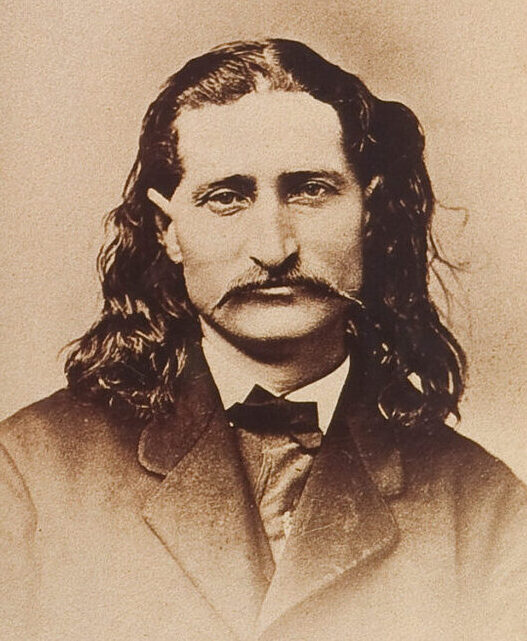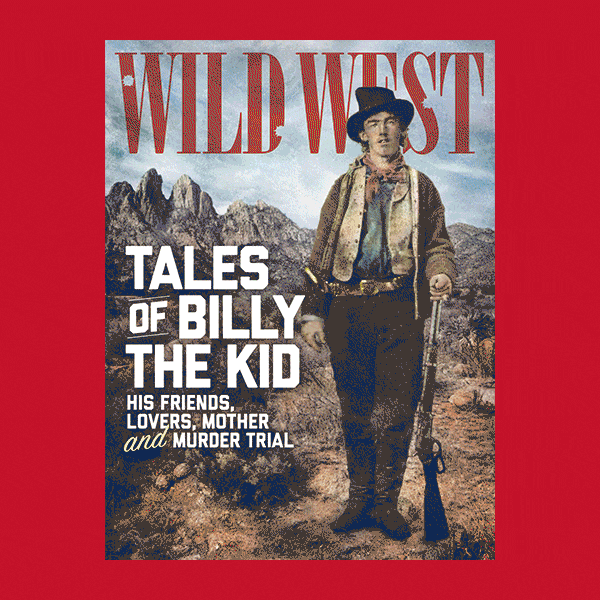In this issue we are delighted to hear from Wild Bill Hickok biographer Joseph G. Rosa, who reexamines the man often considered the top Western gunfighter. Having a reputation as the best pistoleer on the Plains weighed heavily on Wild Bill’s broad shoulders, especially after he accidentally killed a friend on October 5, 1871, while shooting it out with Texas gambler Phil Coe in front of the Alamo Saloon in Abilene, Kansas. That marked the end of Hickok’s career as a lawman.
While Rosa does not believe Wild Bill went into such a downward spiral that he became a half-blind opium addict, tormented by past deeds and gloomy prospects, the English author does recognize Hickok in his late 30s as a man bearing a heavy burden. Given enough time, his reputation as a man-killer in a barely civilized, dangerous environment—namely Deadwood, Dakota Territory—was bound to be deadly. And it didn’t take long, not with assassin Jack McCall lurking in the wings. On August 1, 1876, the day before McCall shot Wild Bill from behind, Hickok wrote in a note to his wife that if “such should be we never meet again, while firing my last shot, I will gently breathe the name of my wife, Agnes, and with wishes even for my enemies, I will make the plunge and try to swim to the other shore.”
Hickok undoubtedly was a different man back in Abilene in June 1871, four months before the dramatic and traumatic Coe shootout. Wild Bill was a single, self-assured, graceful, steel-nerved, larger-than-life two-gun city marshal who personified the public’s image of a good gunfighter—that is to say, the men he killed had been shot down fair and square. It was in June that the legendary lawman allegedly confronted John Wesley Hardin, the pure evil gunfighter. By the end of his life, Hardin probably had killed between 20 and 50 men with six-shooters and shotguns, and no doubt the only reason he lived past the age of 40 was that he spent so much time in prison.
At the time of the dream showdown of professional gunfighters, Hickock would have been 34 and Hardin just 18. According to Hardin’s autobiography, when Hickok drew a six-shooter and announced he was arresting the young gunman, Wes presented his two six-shooters butt forward to Wild Bill and then rolled them over in his hands so they were fully cocked and sticking in the marshal’s face. At that point, Wild Bill supposedly said, “You are the gamest and quickest boy I ever saw,” and the two gunfighters put away their guns, ordered some drinks and became friendly.
“I didn’t include any reference to John Wesley Hardin in my article because it was based upon sourced material, whereas the Hickok-Hardin confrontation which led to Hardin working the ‘border roll’ on Hickok was hearsay and has no contemporary verification,” Rosa said. The late Dr. Richard C. Mahron, one of Hardin’s biographers, told Rosa he had found no evidence of any such encounter and was convinced Hardin invented it to boost a fading ego. “As a professional psychiatrist,” Rosa explained, “Mahron believed that Hardin’s reference to Hickok as a brave man (in a letter to his wife when in prison) suggests that he regarded Hickok in a heroic light.”
On the other hand, Leon Metz, another Hardin biographer, answers the question, “Did Hardin perform the border roll on Wild Bill Hickok?” with a “resounding ‘Yes!’” Metz adds, “Backing down Wild Bill Hickok was the consummate juncture thus far in [Hardin’s] spiraling, man-killing career….A dead Hickok would have proven nothing, except perhaps that Hardin was lucky. A live Hickok would know for the rest of his life who was the better man.”
John Wesley Hardin a better man than Wild Bill Hickok? The horror! Even if Hardin did face down Hickok, Metz suggests, “The long-haired marshal probably shook his head, shrugged his shoulders and never gave the incident a second thought.” After shooting a friend as well as Phil Coe four months later in the same town, Wild Bill certainly had far more troubling thoughts under his long hair.






